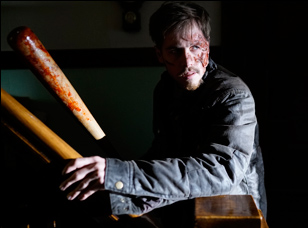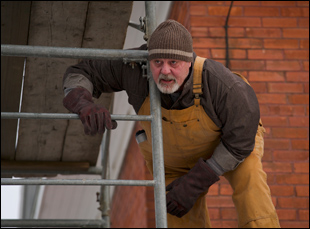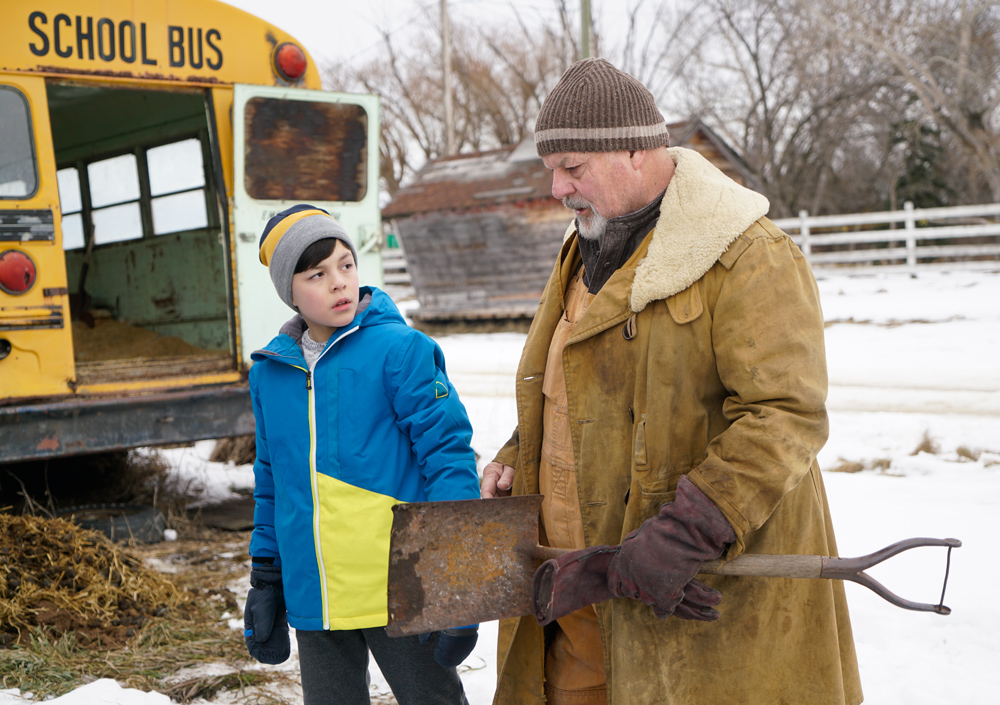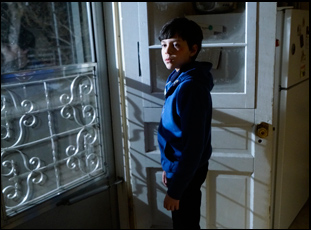“This may be the last interview I ever do,” Michael Peterson tells me with a hearty laugh, seeing only white in front of him as an October snowstorm has ground his car to a halt. While inconvenient for him, it not only meant I had the director’s undivided attention during a recent interview, but also quite possibly the perfect setting to talk about “Knuckleball,” set during one particularly harsh winter where the 12-year-old Henry (Luca Villacis) has been deposited by his parents (Kathleen Monroe and Chenier Hundal) on the farm of his taciturn grandfather Jacob (Michael Ironside) for a few days as they tend to a family emergency.
Little do they know, the real five-alarm calamity is about to happen back at the farm where after a few hours of bonding between Henry and his grandfather, who pulls him away long enough from his video game to teach him a few things about pitching, Jacob is about to give in to age and the bitter cold, leaving the young Henry largely to his own devices to survive not only the weather, but a nosy next door neighbor named Dixon (Munro Chambers) who wants into his grandfather’s house for unknown reasons. As it turns out, Henry is handier with a shovel he first appears and while Jacob’s body may have given out, his spirit remains quite active, making for some unexpected surprises when Dixon persists in a mission to get onto the property.
Peterson, who made his feature debut with the comedy “Lloyd the Conqueror,” about live-action role players who find themselves in battle with the real world, once again suggests there are some transferrable skills between the games people play and how they can survive when thrust into harrowing situations, but does so in “Knuckleball” with the elan of a sleek thriller rather than a ribald comedy. With a wisened, grizzly turn from Ironside as Henry’s gramps, the film carries some gravitas as well as a swagger that separates it from your usual home invasion potboiler and Peterson and co-writer Kevin Cockle fiendishly lay down plenty of traps through Henry that Dixon may have trouble escaping, but they don’t, delivering one intense, slippery moment after another. With the film now in theaters following a premiere earlier this year at Fantasia Fest, the writer/director spoke about how fears of being a parent inspired the film, the paternal role Ironside took on during the production and shooting in the freezing cold.
I’ve got a writing partner and sometimes he comes up with the ideas and sometimes I come up with them and we’ll bring them to each other and hammer them out together. This one, very firmly, started with the insecurities and anxieties of being a parent. Within the first years of having a child, you know that they need you to protect them and you’re worried that you might not be able to do that. You might be at the playground with them and you turn your head and you can’t find them for five minutes as they’re hiding behind a tree and you’ll lose your mind. It was built around that idea.
Since this is called “Knuckleball,” how did the idea of baseball work its way into this?
Quite simply, my co-writer is a huge baseball fan. He started life as an economist and a money manager type guy who loves the stats in baseball. [For the purposes of the film] it could’ve been hockey or any sport because it’s [something of] a McGuffin where it fulfills a function, and since he loved baseball, I [said] “Let’s put that in there” because I don’t have a sport that I’m a hundred percent behind, besides maybe boxing and I don’t think that’s the right one. [laughs] But I came to like the incongruity about baseball at that time of year. There’s a whole bunch of things in this film that don’t quite line up the way they’re supposed to, hopefully to give it a slightly off-kilter feeling. For example, everything is just a little out of place in that house.
Did you immediately imagine it should be winter in Edmonton when you were thinking about this and these particular locations?
Yeah, it was the coldest I’ve ever been in my entire life and I worked on the oil rigs in the middle of the north in the winter, prior to that point at university, so hopefully we captured that coldness on film and I don’t get scared very easily, but at night, I would take off for five minutes and walk the property while I was thinking about something, and I stopped doing that because it was creepy, man. [laughs] It was a creepy spot. There was like the one bus that you see [in the film], but there were two or three more on the property that you might be able to spot in some shots. One of them had been converted into a pig [transport] that may have been a vehicle that they took pigs to market. It was a very strange place with over a hundred years of history and unfortunately, its heyday is well past, so it’s almost like this ghost on the prairie just sitting there.

I love Michael Ironside. I’ve been a big fan of his work forever and I met him about a dozen years ago in L.A. randomly. I was in my car [with] my Canadian plates on and he pulled up beside me and said, “Hey, are you from Canada?” [laughs] And I was like, “What?!? Like you’re Michael Ironside.” And he [said],” Yep. Why are you down here?” And I told him I was here doing an internship and we kept talking over a series of red lights. [At the end] I told him I’d call him one day when I had the right role, and he said, “Sure, man.” I figured he wouldn’t really remember, but then a friend of mine who was one of the producers on this film had just done a film with him and I didn’t have [Michael’s] contact information anymore, but [when my friend said] “Yeah, I’ll throw him the script,” I told him, “Tell him the story!” And Michael Ironside corrected him on the story because some of my details were different than he remembered it, but then like 16 hours later, he’s like “Let’s hop on a call” and said, “I want to do it. I loved your script and this sounds like a lot of fun.”
I understand you actually tailored the script to him in some interesting ways. What was your collaboration like?
It was really good. I had a meeting with him well before we started shooting and he started telling me some of the stories about his father growing up. There was one story in particular that stuck with me where his dad’s best friend had just died and he overheard his dad after the funeral talking to his nephew, who was the around] eight years old, telling him that refrain that happens in the film about trying to fix what you can and stuff that you can’t, you leave behind and then you die. This moment and that type of man and that era where people weren’t as willing to express themselves and held stuff back and weren’t as open with their feelings just struck me as the right note [for this film], so I sent Ironside a text saying, “Can you tell me exactly what that line was that your dad said?” And he told me and I sent him a next draft of the script [where] I put that in and I think it just created a deeper connection or a way to personalize the role. On set, it felt like he got very emotional at times playing that role, going through some of those memories and bringing up some of those things for him.
How did you find Luca to play the young boy Henry?
Luca was actually the first child actor sent to me, but that [casting] felt like one of the big challenges on this film was to get the right kid, one that you can relate to and that isn’t going to be annoying if you’re watching it as an adult and Luca was really special. When I first saw his tape, he was playing twins and I wasn’t sure if he was playing twins or if he had a twin brother – I actually had to call and double check. He’s just so mature and his family is nice – that’s certainly the other half of the equation when you’re working with kids. You want to make sure that the parents seem like they’re going to work with because essentially you’re going to be working with both of them.

No, that was my intention from the very beginning. It’s a pet peeve of mine when you get locked into shooting screens. It’s annoying more than anything because it just forces what you have to shoot, and sometimes that’s good thing and sometimes that’s bad, but I guess it’s in my anti-authoritarian nature that it always feels like you’re being told what to do if you have to show something on a screen, so my first instinct [was to add it as another layer onscreen] and then I also thought it was a really good way to place [Luca’s character] firmly as someone not from the country, not from the place he was going to, and of a different generation and different culture, just more of a modern person. And then [I thought], why not show that video games can have positive outcomes? [laughs]
Was there a particularly crazy day of shooting on this?
A whole bunch. The first day we jumped right into the heart of it with some very intense scenes with Munro and Luca. Some people like to ease in, but on this one, we just wanted to jump into the deep end and dig right in, so it’s always hard, though I wouldn’t say harder than normal. Then of course, the weather was just so cold when we were outside at night that the grease on the zoom lens froze and we couldn’t use it for the rest of the day. We had to regrease with some kind of arctic grease.

These are all my interests, but I did want to do something wildly different. I’m really proud of that as my first film, and I think I was proving something a little different than what I hope I’m proving in this film. Everyone was saying [before that], “Well, you can’t make a feature until you’ve made a feature,” and I was like, “Well, how do you make a feature?” So part of that was to prove that I can do it, and I really like comedy, but in that type of film, I feel the authorial voice of the director is better left a little bit outside the lens because the point of it is to hopefully be as funny as possible and if the director gets too over-directory, they can get in the way of the comedy. Whereas with a film like “Knuckleball,” it’s really about the authorial intent of the director and how the shots are composed and where the camera goes, so I was really looking forward to doing something with a lot less dialogue and a little bit more visual flair. The comedy is a lot more fun to sit through [personally] – I’m a lot more judgmental on this one, but [when I saw it at the film’s premiere at] Fantasia [Fest in Montreal], that’s the kind of thing that blows it out of the water and makes it feel like you’re really connecting with your tribe. Making something that’s connecting with the type of people you want to be connecting with on this type of film is amazing.
“Knuckleball” opens on October 5th in Los Angeles at the Arena Cinelounge.





